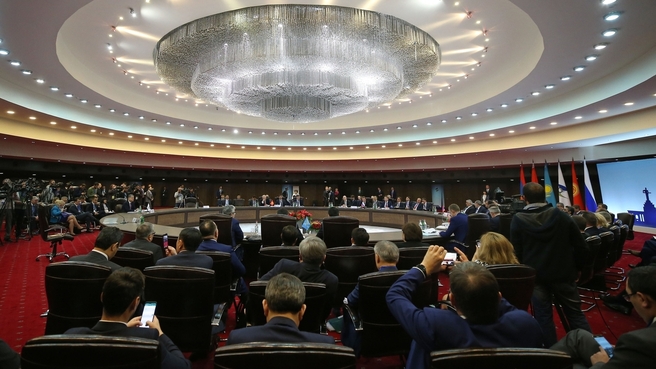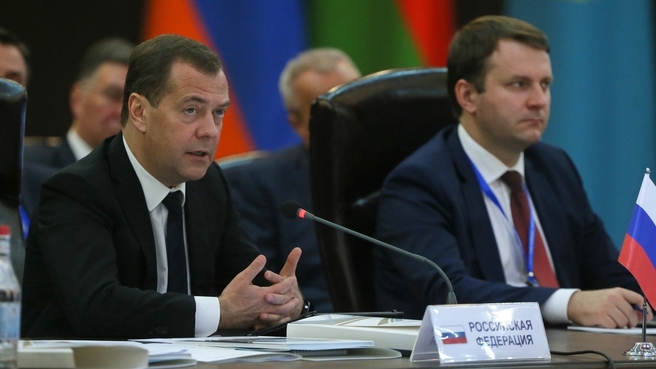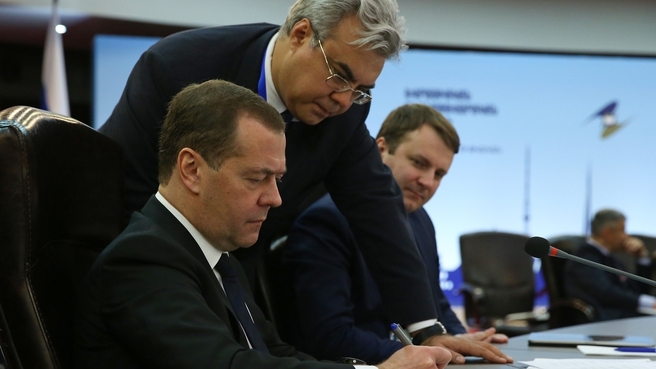Dmitry Medvedev: “In 2018, the Union’s overall GDP grew by 2.5 percent. Trade with third countries increased by 19 percent, and mutual trade between the participating countries went up by more than 9 percent due to an increase in the volume of goods being moved. There is a positive trend in industrial production – an increment of about 3 percent.”
Dmitry Medvedev’s remarks at the Eurasian Intergovernmental Council meeting
Documents signed following the meeting of the Eurasian Intergovernmental Council
List of delegation heads taking part in a meeting of the Eurasian Intergovernmental Council:
Prime Minister of the Republic of Armenia Nikol Pashinyan
Prime Minister of the Russian Federation Dmitry Medvedev
Prime Minister of the Republic of Belarus Sergei Roumas
Prime Minister of the Republic of Kazakhstan Askar Mamin
Prime Minister of the Kyrgyz Republic Mukhammedkalyi Abylgaziev
Chairman of the Board of the Eurasian Economic Commission Tigran Sargsyan
Dmitry Medvedev’s remarks at the Eurasian Intergovernmental Council meeting
Good afternoon, colleagues. Mr Pashinyan, welcome as Chairman of the Council. And once again, I also welcome all the participants in this expanded format meeting.
I would like to join the words of gratitude that were addressed to our Armenian colleagues for the warm welcome, the good organisation of the event, the excellent atmosphere and the beautiful weather, of course.
For the first time, the meeting of our council is attended by the new Prime Minister of Kazakhstan, Askar Mamin. We have known him as a member of the Council of the Commission. He is deeply immersed in the topic of integration. We wish you continued success in your new position.
I would also like to join in the greetings on the upcoming holidays, above all Victory Day, which is traditionally celebrated in our countries.
Taking this opportunity, I would like to say a few words of gratitude to the first President of Kazakhstan. It was Nursultan Nazarbayev who in 1994 proposed the idea of integration in the format we are implementing now. I have repeatedly discussed it with him at the beginning of this decade, when the Customs Union was created. In a month, the anniversary summit of the Eurasian Economic Union will be held in the capital of Kazakhstan. This is a landmark event. Five years ago, our countries decided to move forwards together, to jointly address current problems and find new opportunities for developing our economies. This is exactly why we cannot forget about this.
Five years is a relatively short period of time; nonetheless, it is possible to talk about specific results. The most important result is that the integration project has proved successful, and that it works. The common market of our five member states continues to develop, and there have been positive changes in all areas. The business community has become actively involved in integration processes, and new prospects are opening up for entrepreneurs. We view all the decisions being discussed and adopted by us from the perspective of their possible influence on the business community, and whether they will make life easier for them or create any additional risks. This is why it is useful for such formats to take place at the level of governments.
Most importantly, our economies should feel more confident as a result of integration; and, of course, the citizens of our countries should perceive the beneficial consequences of integration. This is proved by specific statistics. In 2018, the Union’s entire GDP increased by 2.5 percent. We have accomplished our task, and we have ensured the Union’s economic growth rates total at least 2 percent. We need to aim at such results this year. Our trade volume has been cited here; the figures are really quite good. I will cite them again. With third countries, trade increased by 19 percent; mutual trade between the participating countries, by more than 9 percent due to an increase in the volume of goods being moved. There is a positive trend in industrial production – an increment of about 3 percent.
But there are goals we must focus our efforts on in the near future. Our colleagues have already listed them, and I would like to discuss them too.
The first is the development and introduction of digital technology, which is crucial for increasing the competitiveness of our economies. We are working on it intensively, and have adopted a roadmap for the implementation of digital projects; we are working on joint approaches to digital commerce. Another roadmap is being prepared for the development of online trading platforms. A one-stop-shop services model in the five-nation format has been prepared for consideration. The implementation of this system will harmonise all procedures and simplify the relationship between business and government agencies. We also need to introduce other digital solutions, including industrial production. This should help develop the Eurasian network of industrial cooperation and technology transfer. We need to establish services for business, involve small and medium enterprises in the production chains of large manufacturers. New technology will allow us to achieve the optimum employment of production capacity and stimulate innovation in our economies.
My second point has to do with the consolidation of the internal contour of integration, the improvement of supranational regulation. We are working on it continuously and have discussed it in detail in our restricted format meetings. We still have a lot of obstacles to the free movement of goods, capital and labour. And it is obvious that these obstacles exist in all our economies. It is clear that obstacles like this exist in all economies – there is no sterile economy that arouses the envy of others. All of us have to move in this direction. In our work we are guided by our action plan – a road map – however, we aren’t making fast progress on the implementation of this plan. This tends to have an impact on business activity, so we need to look more closely into the situation. An agreement was signed on coordinating our finance laws. We also need to move forward in this area. So far, Russia is the only country that has carried out the necessary domestic procedures. We would like to ask our colleagues to speed up the ratification of this agreement.
The governments and the national banks [in our countries] are developing a concept for forming a common financial market. Here we also have to address many issues, both legal and technical. We need to work on this.
The third issue I would like to bring up is improving technical regulation. It is in the common interest that quality products that comply with our common standards make their way to the union’s market. This has to do with consumer safety, especially if these are food products. We have 47 technical regulations that are effective now and this is our common achievement. Another 12 regulations are in the pipeline. I suggest we move faster to coordinate them and ensure tight control over compliance with them.
Fourth, we need to ensure market transparency. We need an effective mechanism for tracing [the origin of] goods. We have to put in place conditions that will not lead to introducing new and excessive requirements. We are currently working on the Agreement on the Uniform System for certifying the origin of goods that have cleared customs. We have a number of proposals – we have just reviewed them – and we hope they will be approved and we will have a mechanism that really works. The system of marking goods has earned a good reputation for traceability. Let me recall that we started with furs. This helped us reduce informal trade and increase legal trade in furs. An agreement on marking goods with means of identification entered into force on the entire territory of the European Union. We will be able to toughen control over trade on the territory of the five member-states. This practice should be extended to other products. We have just seen the presentation. Indeed, it is necessary to create a system that will be acceptable in all countries. It should be a uniform, convenient system both at the inter-governmental level and, most important, for the customers.
Russia has already introduced mandatory marking of some goods. We will continue moving forward along this road. I would like to emphasise once again that this work should be synchronised.
A few words about international cooperation. We are striving to make the union a fully-fledged participant of global trade. Our association is open for dialogue with foreign partners. We have a free trade zone with Vietnam and our trade is growing. Last year we signed agreements with Iran and China. Let me recall that we are conducting talks with other countries as well, for instance, Singapore, India, Egypt, Serbia and Israel. Moldova has received observer status.
I believe we should promote cooperation with our CIS neighbours, expand opportunities for joint activities and develop mutually beneficial cooperation with countries in all the world’s regions. We should pay special attention to the Asia-Pacific Region that is making steady headway, Latin America and many others. This will give us substantial advantages in promoting Eurasian goods in foreign markets and this is really vital.
Thank you very much for organising this meeting.
Documents signed following the meeting of the Eurasian Intergovernmental Council:
– Resolution on the implementation of the Eurasian Network of Industrial Cooperation, Subcontracting and Technology Transfer project
– Resolution on the use of national cryptographic standards for electronic digital signature (electronic signature) in cross-border information interaction between business entities of the Republic of Armenia, the Kyrgyz Republic and the Russian Federation, and the executive authorities of the Republic of Armenia, the Kyrgyz Republic and the Russian Federation
– Resolution on amending the Eurasian Economic Commission Board Resolution No. 90 of 29 May 2018
– Resolution on the entry into force of the Eurasian Economic Commission Board Resolution No. 11 of 22 January 2019
– Directive (instruction) on progress in removing obstacles by member states on the domestic market of the Eurasian Economic Union
– Instruction on approving uniform approaches to determining the country of origin when exporting goods
– Instruction on standards for the distribution of the amounts of import customs duties among the budgets of the member states of the Eurasian Economic Union
– Directive on creating conditions for the development of a digital trading ecosystem in the Eurasian Economic Union
– Directive on the Eurasian Economic Commission’s annual report on monitoring assessment work done on the regulatory impact of draft resolutions of the Eurasian Economic Commission in 2018
– Resolution on describing the reference model for the nationwide single-window system of regulating foreign economic activity
– Directive on presenting a candidate for member of the Council of the Eurasian Economic Commission to the Supreme Eurasian Economic Council
– Directive on presenting a candidate for member of the Board of the Eurasian Economic Commission to the Supreme Eurasian Economic Council
– Directive on the time and place of the next meeting of the Eurasian Intergovernmental Council
– Instruction on the concept for the creation and functioning of the EAEU Agency for the management of Eurasian integration projects and programmes under the Commission
















